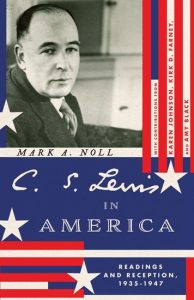 Summary: Tracking the history of how Lewis was received in the United States.
Summary: Tracking the history of how Lewis was received in the United States.
Not using these words, it seems that Noll is making the case that while Evangelicals may be defined as those who love Billy Graham, ecumenicals may be defined as those who love CS Lewis. Noll traces the response in the United States over three chapters. US Catholics first promoted (and published) Lewis in the US. The secular media and academy also responded to Lewis. And then mainline Protestants and finally, the Fundamentalists and Neo-Orthodox. Noll didn’t explicitly say that ecumenical Christians are the ones who like Lewis, but that does seem to be his point. Within Catholics, Mainline Protestants, and fundamentalists, some are less interested in moving outside of their own circle of Christians. But in some ways, the Neo-Evangelicals that were breaking away from Fundamentalists were, as a movement, more ecumenical, and while they found Lewis later, their embrace was in some ways because of Lewis’ ecumenical approach that sought to use common reasoning and logic and public intellectual resources to make the case for Christianity.
Again, this was not a part of Noll’s book, but I do think that it is relevant to talk about the recent movements within SBC, PCA, and ANCA to adopt more theologically conservative positions on women in ministry as an example of a movement toward fundamentalist positions. I had Noll for three classes between college and seminary. When I was in seminary, working for a local SBC association and going to a mainline seminary, there was a discussion about whether SBC should be considered Evangelical or Fundamentalist. Even in the mid-90s, some people in SBC embraced the term fundamentalist. Many of the sociologists of religion who were commenting on the question at the time (as I remember it) were noting the tensions between those SBC Evangelicals who were more ecumenical in orientation and those SBC fundamentalists who were not sure of the Christianity of those outside of SBC.
I believe that what happened was that the SBC fundamentalists adopted the term evangelical because of the negative association of fundamentalism, not because of a change in theological position. And now, 30 years later, increasingly hard lines are drawn because the impulse toward ecumenism isn’t seen as embracing the larger body of Christ but as being “liberal.” Noll’s earlier work on the life of the mind is an undercurrent behind CS Lewis in America because the extent to which CS Lewis was embraced reflected the embrace of the life of the mind as a goal.
This book is part of the Hansen Lecture series by the Wade Center. I have previously read The Everlasting People and have on my list to read Community: Action, Faith, and Joy in the Works of Dorothy L. Sayers. I do not know if other books in the series have responses to each chapter, but I liked that in this book. Karen Johnson, who has a good book on Black Catholics in Chicago, responded to the chapter on Catholic reception. Kirk Farney responds to the chapter on secular and mainstream media. And Amy Black responds to the chapter on Protestant reception. Those responses were helpful. Although I did not think they always responded well to his points, they did give additional context.
C.S. Lewis in America: Readings and Reception, 1935-1947 by Mark Noll Purchase Links: Paperback, Kindle Edition, Audible.com Audiobook